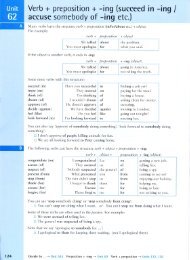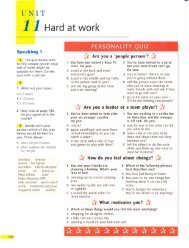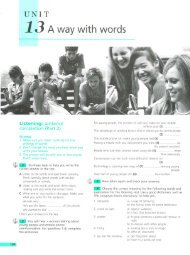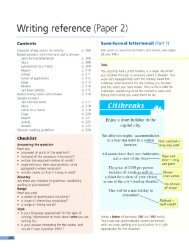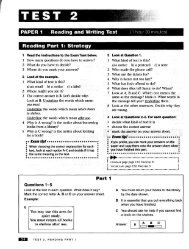T]NIT 3 Fact or fiction?
T]NIT 3 Fact or fiction?
T]NIT 3 Fact or fiction?
You also want an ePaper? Increase the reach of your titles
YUMPU automatically turns print PDFs into web optimized ePapers that Google loves.
T]<strong>NIT</strong><br />
3 <strong>Fact</strong> <strong>or</strong> <strong>fiction</strong>?<br />
Vocabulary 1: phrasal verbs<br />
with look, see and hear<br />
! Vatch the sentence halves.<br />
1 When I read, I try not to look up<br />
2 The government are looking into<br />
3 My cousin Claudia is really looking f<strong>or</strong>ward<br />
4 Like most children, Christopher had always<br />
looked up<br />
5 ln the past very rich families often looked<br />
down<br />
! a) on people who had less money than<br />
they had<br />
I O) to his older brother.<br />
! c) ways of saving energy.<br />
I d; every unfamiliar w<strong>or</strong>d in the dictionary.<br />
I e) to starting university.<br />
I<br />
Complete the following sentences<br />
using w<strong>or</strong>ds from the box.<br />
over f rom through round<br />
back out about<br />
1 I look on the summer of 2000 as<br />
one the happiest times in my entire life.<br />
2 Look ! There's a car coming.<br />
3 We looked ............ the hist<strong>or</strong>ic centre of<br />
the town and then went to have lunch in a<br />
restaurant in the harbour.<br />
4 Would you mind looking ............ my<br />
composition to see if l've made any<br />
mistakes?<br />
5 I used to think Lisa was a wonderful person<br />
but then I saw ............ her.<br />
6 Have you heard Tania since she<br />
went to live in Manchester?<br />
7 Where did you hear............ the concert? I<br />
didn't see it advertised anywhere.<br />
I Use of English: key w<strong>or</strong>d transf<strong>or</strong>mations (Part 4)<br />
Complete the second sentence so that it has a similar<br />
meaning to the first sentence, using the w<strong>or</strong>d given. Do<br />
not change the w<strong>or</strong>d given. You must use between two<br />
and five w<strong>or</strong>ds, including the w<strong>or</strong>d given. There is an<br />
example at the beginning (0).<br />
CLUE: All the sentences require a phrasal verb.<br />
0 I haven't received any news from Pedro since the end of<br />
.luly.<br />
heard<br />
t he.ve.ql!:.bear4.frpn....... Pedro since the end of July.<br />
1 We decided to spend the afternoon expl<strong>or</strong>ing the shops.<br />
looking<br />
We decided to spend the afternoon<br />
the shops.<br />
I haven't had a chance to examine the documents f<strong>or</strong> the<br />
meeting yet.<br />
look<br />
I haven't had a chance<br />
documents f<strong>or</strong> the meeting yet.<br />
I got the inf<strong>or</strong>mation about the scholarship through a<br />
friend of rnine.<br />
heard<br />
I ................. the scholarship from a frrend of<br />
mine.<br />
I will always remember that year as a very happy one.<br />
look<br />
I will always<br />
that year as a very<br />
happy one.<br />
I don't understand why he couldn't recognize the truth<br />
about her.<br />
see<br />
the<br />
I don't understand why he couldn't<br />
her.<br />
lshouted at him to be careful but he still ran across the<br />
road without looking.<br />
out<br />
lshouted at him to............... . but he still ran<br />
across the road without looking.<br />
W
t\lT 3 <strong>Fact</strong> <strong>or</strong> <strong>fiction</strong>?<br />
Reading: gapped text<br />
(Part 2)<br />
About the exam: ln Paper 1, Part2,<br />
you read a text with missing<br />
sentences. After the text you find the<br />
sentences in jumbled <strong>or</strong>der. You<br />
decide where they go in the text.<br />
There is always one extra sentence<br />
that does not fit anywhere.<br />
Strategy<br />
Look at w<strong>or</strong>ds like pronouns (e.9. it,<br />
she), demonstratives (e.9. this, that)<br />
and possessive adjectives (her, their) in<br />
the sentences that have been<br />
removed from the text and decide<br />
what they refer to.<br />
I<br />
Read these sentences from the<br />
Reality fV text on pages 10-1 1 of the<br />
Coursebook and decide what the<br />
underlined w<strong>or</strong>ds refer to.<br />
Ron Copsey was one of a group of<br />
contestants who agreed to live f<strong>or</strong> a year<br />
on a desert island. with cameras<br />
following their attempts to survive<br />
together. (1 ) ...<br />
But there is nothing <strong>or</strong>dinary about<br />
Denise. She is a blind woman of amazing<br />
determination who has succeeded<br />
against all the odds. (2)<br />
She had always dreamed of a musical<br />
career, but this was prevented by the<br />
births of her children. (3) .........<br />
His first single Fvergreen became the<br />
fastest-selling single of all time. lt sold<br />
over a million copies in its first week.<br />
(4) .......<br />
! Vou are going to read an article<br />
about an unusual photograph. Six<br />
sentences have been removed from<br />
the article. Choose from the<br />
sentences A-G the one which fits<br />
each gap (1-6). There is one extra<br />
sentence which you do not need to<br />
use. The key w<strong>or</strong>ds in the sentences<br />
have been underlined to help you.<br />
THE MAN IN THE DOORWAY<br />
A couple of years ago my friend Jack gave me a poster as a<br />
birthday present. It's an aerial photograph of a huge wave<br />
breaking around a lighthouse during a terrible st<strong>or</strong>m. Standing in<br />
the do<strong>or</strong>way of the lighthouse is a man. This person must be the<br />
lighthouse keeper, and the whole picture is very dramatic.<br />
I put the poster on my bathroom wall and I have looked at it<br />
almost every day since Jack gave it to me. I've seen postcards<br />
with the same picture, and a couple of my fiiends have the same<br />
poster. n-f_-l One of my friends claimed that the man had been<br />
killed by the wave a few seconds after the photograph was taken.<br />
She said that this was common knowledge and that that was why<br />
the photograph was so popular.<br />
I was h<strong>or</strong>rified. It seemed terrible that someone would make<br />
money out of a photograph taken just bef<strong>or</strong>e someone had died.<br />
W<strong>or</strong>se still, since it had been taken from the air, the photographer<br />
must have been saf-e in a helicopter. lTT-l The m<strong>or</strong>e I thought<br />
about it, the less comf<strong>or</strong>table I felt about the poster. Eventually, I<br />
took it down and put it in a cupboard.<br />
Even though it wasn't on the wall any m<strong>or</strong>e I couldn't get it out<br />
of my mind. The photographer's name, Jean Guichard, was in<br />
small print just below the image and I decided to try to contact<br />
him. lST-l Guichard himself seemed to have disappeared<br />
without trace and there was no way of getting in touch with him.<br />
I did, however, find some infbrmation on a website about urban<br />
myths. lZT_-] This site described the same st<strong>or</strong>y my friend had<br />
told me about the photographer capturing the last few seconds of<br />
the lighthouse keeper's life. A lot of people believed this st<strong>or</strong>y,<br />
and they had complained to the poster company about the<br />
publication of such a macabre image. I then followed the link to<br />
the poster company's webpage and it was there that I discovered<br />
the real st<strong>or</strong>y, which the company had published to stop the<br />
complaints.<br />
Apparently the st<strong>or</strong>m had lasted f<strong>or</strong> days and the lighthouse<br />
keepeq Theod<strong>or</strong>e Malg<strong>or</strong>ne, was holding on, hoping the<br />
lighthouse would survive the strong waves. Malg<strong>or</strong>ne had heard<br />
the noise of the helicopter, and was intrigued. In spite of the<br />
danger, he opened the do<strong>or</strong> of the lighthouse to see who was<br />
flying by on such a terrible night. lTT--]<br />
The poster company obviously thought that some people might<br />
not simply take their w<strong>or</strong>d f<strong>or</strong> it. lTT_l There are two images:<br />
the one in the poster and a second one showing Malg<strong>or</strong>ne<br />
stepping inside and closing the do<strong>or</strong>. So that's one mystery<br />
solved. The really strange thing is that there's no infbrmation<br />
about Guichard, the photographer. Now I wonder what happened<br />
to him!<br />
'ilw,<br />
il<br />
,1"-Iif-+:"ff'
tr<strong>NIT</strong> 3 <strong>Fact</strong> <strong>or</strong> <strong>fiction</strong>?<br />
! Find w<strong>or</strong>ds <strong>or</strong> phrases in the texts and<br />
sentences (A-G) that mean the following.<br />
1 from the air (section 0)<br />
something known by most people<br />
(section 1)<br />
3 not leaving any evidence (section 3)<br />
strange, frightening and often<br />
connected with death (section 4)<br />
5 very interested (section 5)<br />
6 not hurt (section 5)<br />
*^"'e*#.<br />
,{'#' .a-- a-#"-<br />
7 believe them (section 6)<br />
A These are st<strong>or</strong>ies that many people believe but<br />
which often have no basis in fact.<br />
B I was talking to them about it one day and we<br />
were discussing what had happened to the<br />
lighthouse keeper.<br />
C To avoid this. they provided extra photographs<br />
to back up their explanation.<br />
D Then, after satisfying his curiosity, he simply<br />
closed the do<strong>or</strong> again and was completely<br />
unharmed.<br />
E Although I searched the lnternet f<strong>or</strong> ages I was<br />
unable to find an address f<strong>or</strong> him. though there<br />
were hundreds of sites where I could buy the<br />
poster.<br />
F I wondered why he hadn't tried to rescue the<br />
lighthouse keeper, instead of just taking<br />
photographs of him from the aircraft.<br />
G The wind is very strong, and it is surprising that<br />
the man looks unafraid.<br />
Grammar 1t like, at as iflthough<br />
> CB page 33<br />
I<br />
there are mistakes in most of these<br />
sentences. Find the mistakes and c<strong>or</strong>rect them.<br />
Iike<br />
0 Do you look as either of your grandparents did<br />
when they were your age?<br />
1 You seem like familiar. Have I met you somewhere<br />
bef<strong>or</strong>e?<br />
2 Do like I say. Don't stop to talk to strangers under<br />
any circumstances.<br />
3 She w<strong>or</strong>ks like a press offrcer f<strong>or</strong> one of the biggest<br />
charities.<br />
4 lt looks as though it will be a nice day tom<strong>or</strong>row.<br />
Shall we go to the beach?<br />
5 Like I told you, Simon and Natalie aren't going out<br />
together anym<strong>or</strong>e.<br />
6 I like to do relaxing things at the weekend as going<br />
f<strong>or</strong> walks in the mountains.<br />
7 I have always thought of Santa Cruz like my home.<br />
8 How's the weather like in September?<br />
9 Do you feel as going out f<strong>or</strong> a pizza tonight <strong>or</strong><br />
would you rather get a take-away?<br />
tru
t'\IT 3 <strong>Fact</strong> <strong>or</strong> tiction?<br />
I<br />
Speaking: interview and long turn<br />
(Parts 1 and 2)<br />
About the exam: ln Paper 5, Part 2, you<br />
have to compare and contrast two photos<br />
and say something about them, acc<strong>or</strong>ding<br />
to the examiner's instructions.<br />
Strategy<br />
Make sure you can use the language of<br />
comparison accurately.<br />
Underline the c<strong>or</strong>rect alternatives in these<br />
extracts from Speaking tests, then listen to<br />
see if you were right.<br />
Part 1 (interview)<br />
Examiner: How Iong have you lived here?<br />
Candidate. Nearly two years.<br />
Examiner: (1) What's / How's it like living here?<br />
Candidate: lts great. I think of it<br />
(2) like / as my home now.<br />
Examiner: lt certarnly sounds as<br />
(3) though / always you enjoy it. What would<br />
you (4) think //ike to do when you finish<br />
university?<br />
Candidate: I want to w<strong>or</strong>k (5) as / like an<br />
interpreter. (6) Like /As I explained bef<strong>or</strong>e, I<br />
am going to do a course at a university tn<br />
Australia. l've always wanted to do<br />
something involving f<strong>or</strong>eign languages<br />
(7) such / ltke lranslating <strong>or</strong> interpreting.<br />
Part 2 (long turn)<br />
6 These photographs are (B) like / similar<br />
because they both show people reading but<br />
they are very different in other ways. ln the first<br />
photograph there are two women reading on a<br />
crowded train. lt looks (9) as / like a London<br />
underground train but l'm not really sure if it is<br />
<strong>or</strong> not. lt (10)seems / looks to be winter<br />
because most of the people are wearing coats<br />
and the blonde woman looks (1 1) as / like<br />
though she is very interested in the book. The<br />
man in the second photograph is probably<br />
somewhere (12) as / like Jamaica <strong>or</strong> Barbados.<br />
It's a very beautiful beach and he is obviously<br />
very relaxed. ?<br />
ffi<br />
*,#{*<br />
,'',*<br />
,t<br />
::'qn-ii:-Ftf$<br />
'iir4l..s+,.t${$+\ffis.li
I'\l'l' .l <strong>Fact</strong> <strong>or</strong> tiction?<br />
I Use of English: open cloze (Part 2)<br />
Read the text below and think of the w<strong>or</strong>d which<br />
best fits each gap. Use only one w<strong>or</strong>d in each<br />
gap. There is an example at the beginning (0).<br />
CLUE: ln this text most of the missing w<strong>or</strong>ds are<br />
like, as, seem, if <strong>or</strong> though.<br />
STRANGER THAN FICTION<br />
Stephen King is a very famous auth<strong>or</strong> today<br />
(O) ..hltp. .. it was not always that way.<br />
He had to w<strong>or</strong>k hard to become successful,<br />
(1) . . ... most writers. Until he began to<br />
make money from his writing, he w<strong>or</strong>ked in a<br />
laundry and then later (2) a teacher.<br />
Although his st<strong>or</strong>ies are full of strange characters<br />
and terrifying events, at the same time they<br />
(3) .. to be very realistic to most<br />
readers.<br />
A few years ago, King himself was involved<br />
(4) .. a terrible accident. He was<br />
walking along a country road (5)................ he<br />
saw a car coming towards him. lt was moving<br />
dangerously from one side of the road to the<br />
other almost (6) .. if there was no one<br />
driving it. ln fact, there was a driver but he was<br />
drunk. Although King tried (7) .. hard<br />
as he could to get out of the way, the car hit<br />
him. The driver was not hurt but behaved as<br />
(8)................ he didn't care at all.<br />
King said later that he felt just (9) ................ a<br />
victim in one of his novels. The man even looked<br />
(10)................ someone King had once written<br />
about. lt took Stephen King (11)................ than<br />
a year to recover from the accident and even<br />
things he had always loved doing,<br />
(12) . .... writing, were almost impossible<br />
f<strong>or</strong> him.<br />
Listening: multiple-choice (Part 4)<br />
About the exam: ln Paper 4, Part 4, you hear a<br />
person speaking alone <strong>or</strong> with other people.<br />
You will be asked to answer multiple-choice<br />
questions.<br />
Strategy:<br />
1 Read the questions and the three options.<br />
2 The first time you listen, underline any key<br />
w<strong>or</strong>ds you hear and mark the possible answer.<br />
3 The second time you listen, check your idea.<br />
.J I<br />
questions 1-7, choose the best answer, A, B <strong>or</strong> C.<br />
1 Alice became a writer because<br />
A she was always writing st<strong>or</strong>ies as a child.<br />
B she wanted to do what her aunt did.<br />
C she was keen to do any job that did not involve<br />
routine.<br />
2 What does Alice say about learning to be a writer?<br />
A The writing courses she did were a waste of<br />
time.<br />
B She learnt to write by doing it.<br />
C She found it harder than she expected.<br />
3 What does she say has been a problem f<strong>or</strong> her?<br />
A learning to use a computer<br />
B finding a reliable edit<strong>or</strong><br />
C promoting her books<br />
4 What does Alice like most about being a writer?<br />
A the fact that she has become quite famous<br />
B the unpredictable nature of the w<strong>or</strong>k<br />
C the freedom to choose when she w<strong>or</strong>ks<br />
5 What does she say about the money that she<br />
earns?<br />
A She makes sure that she saves some of it.<br />
B She dislikes the system of payment.<br />
C She finds it difficult to live on.<br />
6 What does she say about travel?<br />
A She wishes she had m<strong>or</strong>e time f<strong>or</strong> it.<br />
B She can't aff<strong>or</strong>d to do it very often.<br />
C She feels it interferes with her w<strong>or</strong>k.<br />
7 Which of the following best describes Alice's<br />
attitude to her job?<br />
A 5he thinks she isn't capable of doing another<br />
job<br />
B She regards it as m<strong>or</strong>e difficult than just a job.<br />
C She thinks that her income from it should be<br />
higher'<br />
You will hear an interview with a writer. F<strong>or</strong><br />
1''u$lilii"lll.*r
tr<strong>NIT</strong> 3 <strong>Fact</strong> <strong>or</strong> <strong>fiction</strong>?<br />
'{'ffi<br />
Gramm ar 2i adverbs > CB page 35<br />
I<br />
Underline the c<strong>or</strong>rect alternatives in the<br />
following sentences.<br />
Our team didn't do too (1) bod / bodly in the<br />
championships - we came fourth. Of course<br />
we had hoped to do (2) best / better but we<br />
certainly could have done a lot (3) w<strong>or</strong>st /<br />
w<strong>or</strong>se.lf we try a bit (4) harder / m<strong>or</strong>e h<strong>or</strong>dly<br />
next year, we might even get to the final!<br />
She behaved (5) very unfriendlily / in a very<br />
uffiendly way when I saw her at Stephen's party.<br />
She just stood (6) still / in a stillway and stared<br />
(7) straight / straightly ahead when I spoke to her<br />
I thought she hadn't heard me so I said, 'Hello'<br />
again a bit (B) loudlier / louderbut she still didn't<br />
answer I think I've offended her somehowl<br />
The University told me that I would be registered<br />
f<strong>or</strong> the course (9) aut<strong>or</strong>uttic / automntical/y as soon<br />
as they received my money, but unf<strong>or</strong>tunately my<br />
letter with the cheque anived (I0) lnte / lafe/y. Now<br />
they say they'll put me on a waiting list but it's<br />
(lI) high / hilly unlikely that I'll get a place on<br />
the course now.<br />
l've been so busy (I2) late / lately that I've<br />
ft! hard / hardly had time to send any emails to<br />
anyone - but it was great to hear from you. I<br />
haven't got much news really except that the other<br />
night Tina and I managed to get into a Mand<br />
concert (I4l free / freeM Tina knew someone who<br />
was w<strong>or</strong>king in the theatre. lt was a great concert!<br />
! Use of English: key w<strong>or</strong>d transf<strong>or</strong>mations<br />
(Part 4)<br />
Complete the second sentence so that it has a<br />
similar meaning to the first sentence, using the<br />
w<strong>or</strong>d given. Do not change the w<strong>or</strong>d given. You<br />
must use between two and five w<strong>or</strong>ds, including<br />
the w<strong>or</strong>d given. There is an example at the<br />
beginning (0).<br />
0 The doct<strong>or</strong> told me the injection would not hurt<br />
very much at all. hardly<br />
The doct<strong>or</strong> told me the injection .ryey!4..La.f4.ty.hy.f!:<br />
at all.<br />
I think the concert will probably not take place.<br />
highly<br />
Ithink i15.............. the concert will take<br />
place.<br />
Make sure you wear clothes that don't restrict your<br />
movements. allow<br />
Make sure you wear clothes that<br />
f reely.<br />
You don't have to pay to go into that museum.<br />
get<br />
You can<br />
f ree<br />
People who make m<strong>or</strong>e eff<strong>or</strong>t usually do better<br />
than others. try<br />
People who ........... usually do better<br />
than others<br />
I thought his behaviour was very silly. behaved<br />
I thought he ................ .. . ....... way.<br />
He didn't stop on the way home. straight<br />
He ......... .. . home.<br />
! Speaking: asking f<strong>or</strong> and reacting to<br />
opinions (Part 4)<br />
About the exam: ln Paper 5, Part 4, you have a<br />
discussion with the other candidate and the<br />
examiner.<br />
Strategy<br />
Make sure you know how to:<br />
. express your opinion<br />
o ask someone f<strong>or</strong> their opinion<br />
o agree/disagree politely.<br />
Read what two students said while they were<br />
answering a question in Part 4. Put the adverbs in<br />
brackets in the best place.<br />
Examiner: What kinds of things do people like to read<br />
nowadays?<br />
Student A; Well, I think that young people enjoy<br />
reading magazines m<strong>or</strong>e than books (usual/y). What<br />
do you think?<br />
Student B: 5ure, but we read books too. My parents<br />
are buying books (always) and my brother and I<br />
b<strong>or</strong>row them and read them (sometimes).<br />
Student A. I don't mean (cerfarnly) that young people<br />
read books (never), just that magazines are<br />
probably m<strong>or</strong>e popular. Don't you agree?<br />
Student B; I suppose so but I think its imp<strong>or</strong>tant to<br />
remember that books are imp<strong>or</strong>tant too (sfl/). lt<br />
seems to me that a new bookshop opens<br />
somewhere in town (almost every day).<br />
Student A: Yes, and as well as that its very easy to<br />
<strong>or</strong>der books on the lnternet (nowadays).
II<strong>NIT</strong> 3 <strong>Fact</strong> <strong>or</strong> <strong>fiction</strong>?<br />
Vocabulary 2: modifiers/<br />
intensifiers ) CB page 38<br />
About the language: Extreme adjectives cannot<br />
be used with adverbs like very. F<strong>or</strong> example, you<br />
cannot say I am very exhausted. Adjectives like<br />
these are called 'ungradable' adjectives. They are<br />
used with adverbs like absolutely and totally.<br />
'Gradable' adjectives like tired cannot be used<br />
with adverbs like absolutely and totally.<br />
I<br />
Vark the underlined adjectives in these<br />
sentences G (gradable) <strong>or</strong> U (ungradable).<br />
1 He told us an absolutely amazing st<strong>or</strong>y<br />
about a trip he went on in Venezuela<br />
2 Apparently it is quite dangerous to camp<br />
in the open there.<br />
3 lt's really hard to learn a f<strong>or</strong>eign language<br />
when you are older.<br />
4 lt was totally impossible to get tickets f<strong>or</strong><br />
the concert.<br />
5 My friend went and she said his latest<br />
book was actually a bit b<strong>or</strong>ing.<br />
6 We went to Adam's party and had an<br />
incredibly oood time.<br />
7 Alejandra hasn't been feeling well but<br />
she looked absolutely fantastic.<br />
8 There was an extremely narrow opening in<br />
the rock that we managed to climb through. .......<br />
I Underline the c<strong>or</strong>rect alternatives in the<br />
following sentences.<br />
A: My cousin is travelling around South East Asia on<br />
her own.<br />
B: lsn't that (1) terribly / absolutely dangerous?<br />
A: No, she says it's actually (2) quite / utterly safe.<br />
A: I think it would be (3) really /fairly amazing to fly<br />
all the way from Europe to New Zealand.<br />
B: Do you? I think it would be (4) extremely / totally<br />
uncomf<strong>or</strong>table and b<strong>or</strong>ing being on a plane f<strong>or</strong> so<br />
long.<br />
A: Daniel is (5) incredibly / absolutely good at<br />
rollerblading. He can do lots of (6) really / fairly<br />
fantastic tricks.<br />
B: Let's face it. As far as you're concerned Daniel is<br />
(7) very /iust fantastic in every possible way!<br />
A: You were (B) quite / totally right about Stephen<br />
King having written Friday 13th.<br />
B: Yes, but I was (9) a bit /totally wrong about him<br />
having directed the film.<br />
Grammar 3: narrative tenses<br />
> CB page 38<br />
I<br />
Complete the st<strong>or</strong>y by putting the verbs in<br />
brackets into the c<strong>or</strong>rect f<strong>or</strong>m: past simple, past<br />
continuous <strong>or</strong> past perfect.<br />
NOT DROWNING BUT WAVING<br />
| (1) ........ (walk) along the beach<br />
talking to my friend when suddenly<br />
| (2) ........ (see) a man in the water<br />
who (3)<br />
. (wave) frantically.<br />
| (4) ...... ........ (not hesitate) f<strong>or</strong> a moment,<br />
but (5)<br />
. (run) straight into the<br />
water to try and save him. Earlier that summer<br />
l(6) ............ (do)a special course to<br />
learn how to rescue people and I<br />
(7) ...... (be) keen on using my<br />
new skills.<br />
| (8) ........ (swim) as fast as I could to<br />
where I (9) ........ (see)the man waving<br />
but when I (10) ... (get)there, he<br />
(1 1) (disappear) completely.<br />
I (12) .......... (/ook) around desperately<br />
but he (13) .................... (be) nowhere to<br />
be seen.<br />
I (14) ..........<br />
I (15) ..<br />
Then I (16)<br />
(feel) very upset when<br />
(get) out of the water.<br />
. ........ (see) the man again.<br />
. (sfand) with my friend<br />
He (17)<br />
and they (18) ... ........ (laugh).<br />
It (19) ......... (turn) out that he<br />
(20) . .......... (be) an old family friend but<br />
they (21).... .. (/ose)contact and<br />
(22) .................... (not see)each other f<strong>or</strong><br />
years. He was just waving to try and attract<br />
her attention !<br />
tffi
ti<strong>NIT</strong> J <strong>Fact</strong> <strong>or</strong> <strong>fiction</strong>?<br />
I Use of English: w<strong>or</strong>d f<strong>or</strong>mation (Part 3)<br />
Strategy<br />
1 Remember to read the title and the whole text bef<strong>or</strong>e you<br />
start.<br />
2 Decide what part of speech goes in each gap.<br />
Read the following text. Use the w<strong>or</strong>d given in capitals below<br />
the text to f<strong>or</strong>m a w<strong>or</strong>d that fits in each gap. There is an<br />
example at the beginning (0).<br />
A GOOD SHORT STORY<br />
Reading has always been an en<strong>or</strong>mous source of (0l.enlpynenfi<br />
f<strong>or</strong> me. I particularly like sh<strong>or</strong>t st<strong>or</strong>ies, especially those with<br />
surprising (1).<br />
One of the most (2).......... st<strong>or</strong>ies l've ever read is called Exit.<br />
It was in a (3).. ....... of sh<strong>or</strong>t st<strong>or</strong>ies we read when I was at school.<br />
It is not exactly a ghost st<strong>or</strong>y, but it is very (4)<br />
ln the st<strong>or</strong>y, a group of people at a country hotel are playing party<br />
games. A man called Desmond says he can make one of the other<br />
guests vanish without a trace. At the beginning of the st<strong>or</strong>y, there is<br />
a brief (5).......... of each of the people so the reader knows that<br />
two of the guests are on their honeymoon.<br />
The lights are turned out so that the room is in total (6).......... .<br />
The game starts, but none of the guests is taking it very (7).<br />
Desmond describes the physical sensations that the person who is<br />
going to vanish will feel. When the game ends, the lights are<br />
switched back on and everyone laughs and says how (8).......... it<br />
was. They all get ready to go to bed. lt is only then that the reader<br />
realises that the girl who was on her honeymoon is now single.<br />
Neither she n<strong>or</strong> any of the other guests is aware of the (9).<br />
of her husband. ln fact, they don't have any recollection of his<br />
(10) He has, as Desmond promised, vanished without trace.<br />
O ENJOY<br />
1 END<br />
2 USUAL<br />
3 COLLECT<br />
4 MYSTERY<br />
5 DESCRIBE<br />
6 DARK<br />
7 SERTOUS<br />
8 AMUSE<br />
9 APPEAR<br />
10 EXIST<br />
1<br />
2<br />
3<br />
4<br />
5<br />
6<br />
7<br />
Writing: st<strong>or</strong>y (Part 2)<br />
> CB page 40<br />
About the exam: ln Paper 2, Parl2,<br />
you choose one question to answer<br />
out of four. One of the questions<br />
may ask you to write a st<strong>or</strong>y.<br />
Strategy<br />
1 Use time linkers to show the<br />
sequence of events.<br />
2 Use narrative tenses c<strong>or</strong>rectly.<br />
I<br />
nead the following st<strong>or</strong>y and<br />
choose which time expression (A, B<br />
<strong>or</strong> C) fits each space.<br />
A TERRIBLE MISTAKE<br />
We got to the little hotel in the village<br />
square very early in the m<strong>or</strong>ning.<br />
(1) . we thought there was<br />
no one there because although we<br />
rang the bell again and again there<br />
was no answer. We were just going to<br />
give up (2) . suddenly the<br />
do<strong>or</strong> opened and an elderly p<strong>or</strong>ter let<br />
us in. We did our best to explain in<br />
our very bad French that we were<br />
s<strong>or</strong>ry to disturb him, and (3)<br />
he seemed to understand.<br />
(4)............... Susan was filling in the<br />
register, I took our cases up to the<br />
room. (5)<br />
I opened the<br />
curtains and looked out into the<br />
square, I knew we had made a terrible<br />
mistake coming here again. There,<br />
sitting at a table in the outdo<strong>or</strong> caf6,<br />
was Charles.<br />
(6) ............... I had had a chance to<br />
move away from the window, he<br />
looked up and saw me. lt had taken<br />
him six years but he had (7)<br />
found us.<br />
A Firstly B First<br />
A when B then<br />
A at the end B eventually<br />
A When B Then<br />
A Soon<br />
A Bef<strong>or</strong>e B When<br />
A then B soon<br />
B As soon as<br />
C At first<br />
C while<br />
C later<br />
C While<br />
C No sooner<br />
C As soon a:<br />
C finally
l.'<strong>NIT</strong> .l <strong>Fact</strong> <strong>or</strong> <strong>fiction</strong>?<br />
! nead this st<strong>or</strong>y. Underline the time<br />
expressions and decide if the verbs (1-21) are in<br />
the c<strong>or</strong>rect tense f<strong>or</strong>m. lf not, c<strong>or</strong>rect them.<br />
At first, I could hardly believe it when my father<br />
(1) had told us that we (2) were g<strong>or</strong>ng to visit<br />
my aunt in Miami. I always (3) wanted to go<br />
there and now my dream (4) was about to<br />
come true. The night bef<strong>or</strong>e, Dad (5) was<br />
<strong>or</strong>dering a taxi to take us to the airp<strong>or</strong>t so we<br />
(6) hadn't needed to take our car. ln the taxi<br />
we were all so excited about our holiday that<br />
nobody (7) was noticing that it (8) seemed to<br />
be taking much longer than usual to get to the<br />
airp<strong>or</strong>t. My father (9) had asked the driver why<br />
it (10) yrzas taking so long and he (1 1) sard that<br />
this (12) uzas his first day as a taxi driver and he<br />
(13) wasn't really sure how to get there. lt was<br />
only then that my father (1 4) realised how far<br />
away from the airp<strong>or</strong>t we (15) had been at that<br />
moment. lt was at least an hour away, and our<br />
plane (1 6) was leaving in an hour and a half .<br />
Finally my father (17) persuaded the taxi driver<br />
to let him drive and eventually we (18) had<br />
arrived at the international terminal. We all<br />
(19) rushed to the check in with our suitcases,<br />
but as soon as we got there we discovered that<br />
the flight (20) was being cancel/ed due to bad<br />
weather. Our frantic rush (21) had been f<strong>or</strong><br />
nothing.<br />
! t-ook at these stages of a st<strong>or</strong>y. Which <strong>or</strong>der<br />
should they come in?<br />
I<br />
a) first events and/<strong>or</strong> a problem<br />
E<br />
I c) final outcome<br />
I Ol later actions <strong>or</strong> results<br />
I<br />
nl background inf<strong>or</strong>mation<br />
took back at the st<strong>or</strong>y in Exercise 2. Does it<br />
follow the same <strong>or</strong>der? Divide it into four<br />
paragraphs.<br />
I<br />
t-ook at the sentences below. Decide which<br />
stage of a st<strong>or</strong>y (A, B, C <strong>or</strong> D) each one comes<br />
from.<br />
1 At last he managed to reach the sh<strong>or</strong>e, and<br />
he knew he was safe.<br />
2 lt was a warm, summer's evening and a light<br />
breeze was blowing across the bay.<br />
3 She never f<strong>or</strong>got the old man's kindness.<br />
4 When we finally got there, most of the other<br />
guests had already left.<br />
5 I knew it was going to be a bad day as soon<br />
as I heard the phone ringing at 6 a.m.<br />
6 Delia didn't recognise Matthieu at frrst, but<br />
as soon as he spoke she knew who he was.<br />
7 He knew that she never remembered their<br />
wedding anniversary.<br />
B Suddenly he looked around and realised that<br />
he was alone - the <strong>or</strong>deal was over.<br />
tr<br />
Tr<br />
r<br />
tr<br />
T<br />
tr<br />
T<br />
! choose one of the'background<br />
inf<strong>or</strong>mation' lines from Exercise 5 to begin your<br />
own st<strong>or</strong>y. Plan the other stages of your st<strong>or</strong>y.<br />
Then write it in four paragraphs in your<br />
notebook. Remember to use sequencing w<strong>or</strong>ds,<br />
and to check the f<strong>or</strong>m of the verbs you use.<br />
W


![T]NIT 3 Fact or fiction?](https://img.yumpu.com/28240481/1/500x640/tnit-3-fact-or-fiction.jpg)
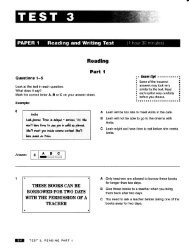
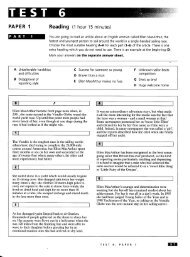
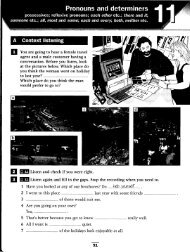
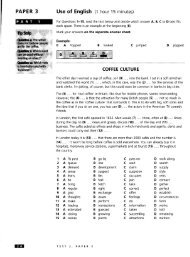
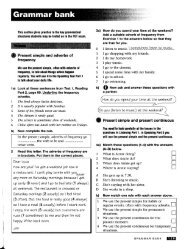
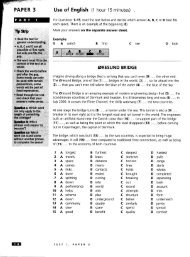
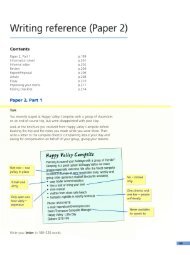

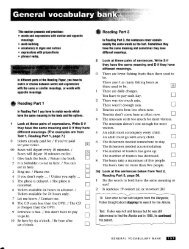
![T]NIT 9 A new look](https://img.yumpu.com/40125756/1/190x248/tnit-9-a-new-look.jpg?quality=85)
